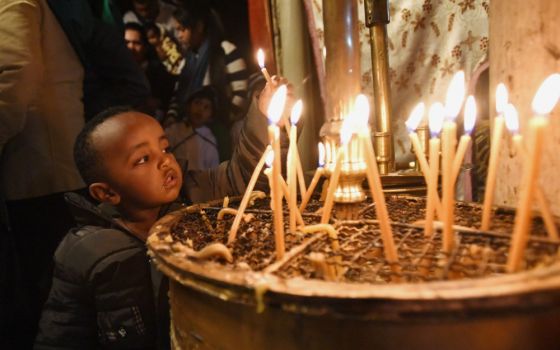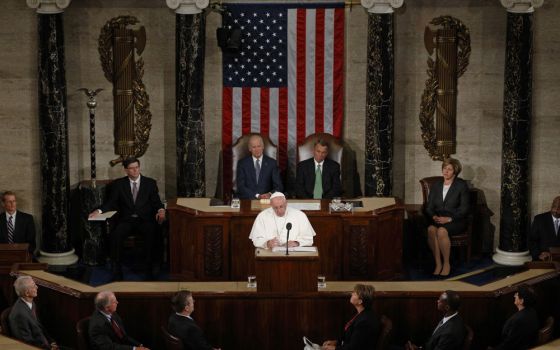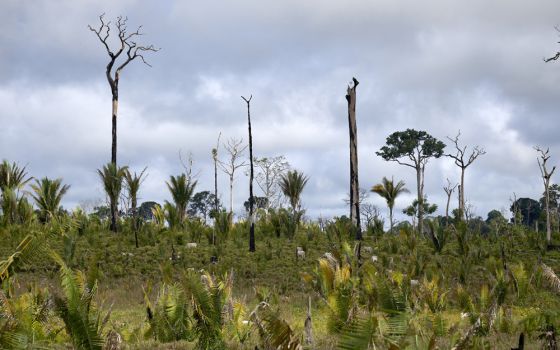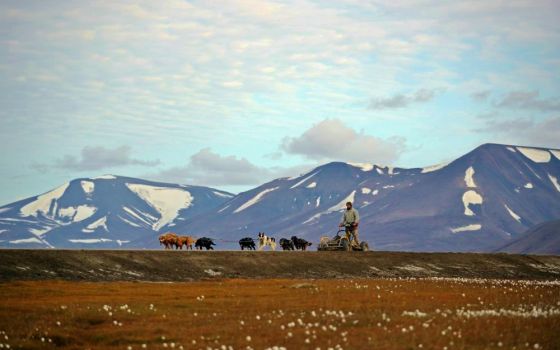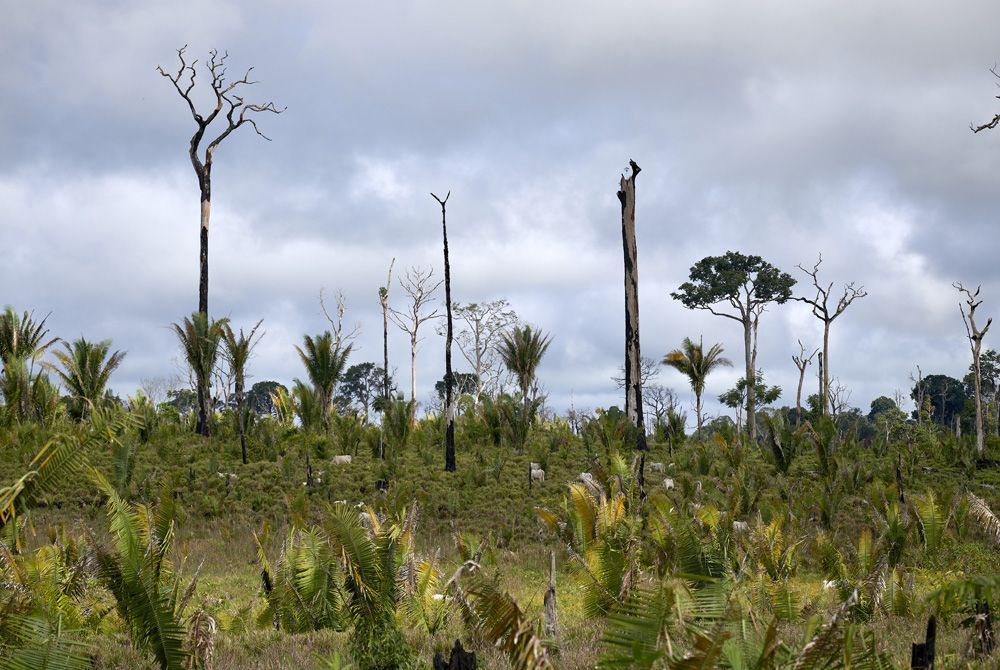
A photo taken March 14 shows the countryside near Anapu, Brazil. (CNS photo/Paul Jeffrey)
Editor's note: NCR is sharing Advent reflections based on "Laudato Si', on Care for Our Common Home," by former NCR editor and publisher Arthur Jones. These were originally published in 2015 by St. Vincent de Paul Parish Community in Baltimore. He wishes to acknowledge the inspiration of the Celtic invocations of Alexander Carmichael's Carmina Gadelica. We'll publish his reflections for Weeks 3 and 4 on Dec. 15 and 22. You'll find an introduction to the series here, and the first installment here.
Let's get personal. What about me? I'm the writer of this excursion into meditation. What is my personal involvement, my personal stake in these ecological issues and thoughts I am then passing on to you?
Quite frankly, I am part of the problem. At the time this was written, my wife and I lived in a rural part of Maryland. We made do with one car. We wiped our salvageable tinfoil for reuse, washed out our ziplock bags, and recycled everything recyclable. My wife had organic gardens with horse and chicken manure from our neighbors' stables and coops. Our table scraps went back to the chickens.
We cherished our many trees, and knew water was precious, for we had a well and a septic system. We have a simple-living daughter who pointed out we were crazy to be operating our own utility systems when in a city or suburban area we could simply plug in to water, gas, sewage and storm drain lines. And our daughter was correct. For all our caring, I fear my wife and I had the carbon footprint of a small island nation.
Trucks had brought in our heating oil, yes, oil. And our propane. We drove 62-mile round trip to church; 24 miles to the supermarket; 28 miles for copy paper and computer ink. Had we known back then what we know now, we'd have replaced this energy use with solar energy. These days we live in an apartment. With the pope as a prod, we ask what else we can do. Such as, how can we persuade everyone in the developed world to do likewise?
O God, let me cultivate ecological virtues.
Sunday, Dec. 8: Misguided lifestyles
The pope takes us further into his ecological excursion of Laudato Si' along paths that can then lead us into the mystery of the universe or the message of each creature in the harmony of creation, to reflecting on a universal communion or the gaze of Jesus. Or, we can consider technology's creativity and power. Then there is the crisis and effects of modern anthropocentrism. That's when humanity treats itself as the pre-eminent element in creation.
Anthropocentrism is the longest section in the encyclical, for Pope Francis wants us to hear again the crass motivations that are literally ruining the Earth and discounting the humanity of humanity:
Neglecting to monitor the harm done to nature and the environmental impact of our decisions is only the most striking sign of the disregard of the message contained in the structures of nature itself. When we fail to acknowledge as part of reality the worth of a poor person, a human embryo, a person with disabilities — to offer just a few examples — it becomes difficult to hear the cry of nature itself; everything is connected. Once the human being declares independence from reality and behaves with absolute dominion, the very foundations of our life begin to crumble. …
This situation has led to a constant schizophrenia, wherein a technocracy which sees no intrinsic value in lesser beings coexists with the other extreme, which sees no special value in human beings. …
A misguided anthropocentrism leads to a misguided lifestyle. … [And] the rise of relativism that sees everything as irrelevant unless it serves one's own immediate interests.
The pope continues to draw for us more than the "big picture." He is illustrating additional elements of his much larger, wider, multidimensional picture, one that touches on every element of concern for every thing that lives; that, plus many elements of concern about those who are anti-life, whether as a philosophical stance, or because some living things intrude on their ideas of progress, or of making a profit. In tomorrow's reflection the pope's distress becomes apparent.
O God, let me cultivate ecological virtues.
What do our nation and its major groupings pursue that is corrupt enough to threaten the ecology and the poor?
Monday, Dec. 9: An extraordinary step
Here is where the pope takes his stick and draws in the sand the dichotomy he sees. He begins with "the culture of relativism … the same disorder that drives one person to take advantage of another." It is relativism, he insists, that allows a person "to treat others as mere objects, imposing forced labor on them or enslaving them to pay their debts. The same kind of thinking leads to the sexual exploitation of children and abandonment of the elderly who no longer serve our interests.
"It is also the mindset of those who say: Let us allow the invisible forces of the market to regulate the economy, and consider their impact on society and nature as collateral damage. …
"Is it not the same relativistic logic which justifies buying the organs of the poor for resale or use in experimentation, or eliminating children because they are not what their parents wanted? This same 'use and throw away' logic generates so much waste, because of the disordered desire to consume more than what is really necessary. We should not think that political efforts or the force of law will be sufficient to prevent actions which affect the environment because, when the culture itself is corrupt and objective truth and universally valid principles are no longer upheld, then laws can only be seen as arbitrary impositions or obstacles to be avoided."
With that statement (I believe) the pope is calling on us for an examination of our "other" conscience — our "national conscience." What do our nation and its major groupings pursue that is corrupt enough to threaten the ecology and the poor?
Let's look again at what he said: "When the culture itself is corrupt and objective truth and universally valid principles are no longer upheld, then laws can only be seen as arbitrary impositions or obstacles to be avoided."
We must answer — from our own moral citizenship/sociopolitical conscience. We do that while relying on the foundation that is our Christian conscience, and identify where and on what issues our national culture and our nation's interpretation of universally valid principles are "corrupt." We can identify what the nation and/or major groupings are doing that is corrupt, in case after case, by measuring its behavior against universally valid principles.
Then we must ask ourselves whether this is an extraordinary step we are being called on to take — the pope telling us that as Christians we cannot be aware of national instances, items and trends that are corrupt and not stand up and oppose them. Is Pope Francis telling us we have a moral obligation to be involved in a sociopolitical way — and by extension, to not do so is socially sinful behavior?
O God, let me cultivate ecological virtues — and probe more deeply into what is being asked of me.
Tuesday, Dec. 10: Culture and spirituality
Pope Francis explains:
It is possible that we do not grasp the gravity of the challenges now before us. … But human beings are not completely autonomous. Our freedom fades when it is handed over to the blind forces of the unconscious, of immediate needs, of self-interest, and of violence. In this sense, we stand naked and exposed in the face of our ever-increasing power, lacking the wherewithal to control it. We have certain superficial mechanisms, but we cannot claim to have a sound ethics, a culture and spirituality genuinely capable of setting limits and teaching clear-minded self-restraint. …
Although change is part of the working of complex systems, the speed with which human activity has developed contrasts with the naturally slow pace of biological evolution. Moreover, the goals of this rapid and constant change are not necessarily geared to the common good or to integral and sustainable human development.
At times we see an obsession with denying any pre-eminence to the human person; more zeal is shown in protecting other species than in defending the dignity which all human beings share in equal measure. Certainly, we should be concerned lest other living beings be treated irresponsibly. But we should be particularly indignant at the enormous inequalities in our midst, whereby we continue to tolerate some considering themselves more worthy than others."
What separates me from you, God, as I find myself standing in the midst of creation's problems wondering where to go, is that I'm trying to stand and assess in a hurried, "rapidified" world that doesn't want me to stand but to move faster.
Perhaps I'm rapidified into trying to get more material possessions, or caring for or worrying about possessions I have that I may not even need. But I don't think that is the case.
Perhaps when I can find moments to stand still — or, better, sit — maybe the issue is I am not using any of that time reflecting on how I might better help a threatened natural order and neglected peoples. Then I could put those reflections into action, with others, and resist being rapidified.
Perhaps "slowing down" is the "joining with You" that I can achieve as I meditate?
O God, let me cultivate ecological virtues.
Perhaps when I can find moments to stand still — or, better, sit — maybe the issue is I am not using any of that time reflecting on how I might better help a threatened natural order and neglected peoples.
Wednesday, Dec. 11: Rampant individualism
Why, as individuals, as concerned communities, indeed as a nation, standing against these horrific trends the pope describes, do we tolerate these end results? The pope answers, "Our difficulty in taking up this challenge seriously has much to do with an ethical and cultural decline which has accompanied the deterioration of the environment.
"Men and women of our postmodern world run the risk of rampant individualism, and many problems of society are connected with today's self-centered culture of instant gratification. We see this in the crisis of family and social ties and the difficulties of recognizing the other. Parents can be prone to impulsive and wasteful consumption, which then affects their children who find it increasingly difficult to acquire a home of their own and build a family.
"Furthermore," he continues, "our inability to think seriously about future generations is linked to our inability to broaden the scope of our present interests and to give consideration to those who remain excluded from development. Let us not only keep the poor of the future in mind, but also today's poor, whose life on this earth is brief and who cannot keep on waiting.
"Hence, 'in addition to a fairer sense of intergenerational solidarity there is also an urgent moral need for a renewed sense of intragenerational solidarity' [quoting Benedict XVI's message for the 2010 World Day of Peace]."
To which, I think we agree, nothing more needs to be added at present.
O God, let me cultivate ecological virtues.
THURSDAY, Dec. 12: No quick fix
Technology, the pope insists, is not the quick fix. In fact, along with the prevalence of the materialistic lusting of the ethos, "the idea of promoting a different cultural paradigm and employing technology as a mere instrument is nowadays inconceivable. The technological paradigm has become so dominant that it would be difficult to do without its resources and even more difficult to utilize them without being dominated by their internal logic."
When the pope tells us "it has become countercultural to choose a lifestyle whose goals are even partly independent of technology, of its costs and its power to globalize and make us all the same," do we suspect he is calling on us to be countercultural in more ways than one?
O God, let me cultivate ecological virtues.
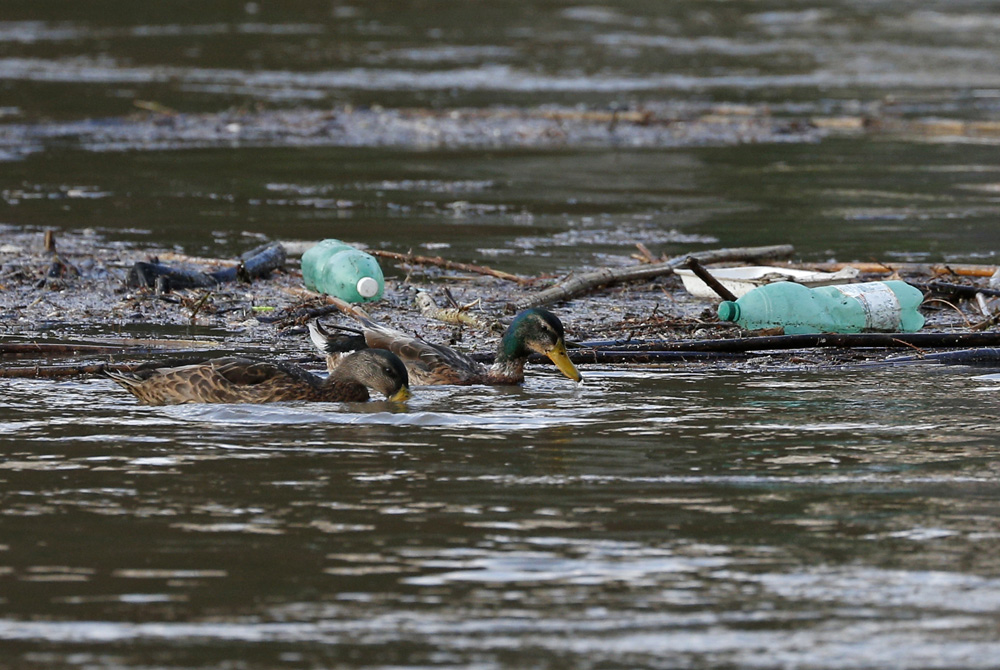
Ducks swim past plastic bottles and other debris floating on the Tiber River in Rome July 28. (CNS photo/Paul Haring)
Friday, Dec. 13: A deeper vision
At this point the mood and accessibility of the encyclical enables us to lighten the load of a not-so-easy subject for reflection then meditation: a love of life, as in everything living. Pope Francis' own joy of life eases us into new pastures for thought.
The pope is particularly drawn to St. Francis. Yet in our new pastures we can find this same yearning for saintliness — an affinity with the natural order as part of the Christian way of life — for most of Christian existence. Indeed, we still see vestiges of it in harvest festivals and the blessing of shipping.
Celtic Christianity, from St. Patrick's time on down to the dawn of the 20th century, offers a love of life in its prayers that transcends time and geography and culture. Their cosmic-rooted love of all life was expressed through rites and rituals based on the natural order and rhythms of the year. These rituals gradually ebbed from rural life as rural life itself declined.
In Ireland, Scotland and on the Outer Isles between the two lands, the seed was consecrated before the planting, accompanied by prayer and a picturesque ritual. The ewes were blessed by the shepherd after their fleece had been shorn. There were herding blessings, and loom blessings and blessings before baking the bread or lighting the fire.
These invocations were collected primarily in the Outer Islands in the 19th century by Alexander Carmichael, compiled in his famous five-volume Carmina Gadelica, the 40-year work of his lifetime, preserved in Edinburgh.
If I regard this encyclical as a form of religious art, and I do for its periodic underlying poetic flair, then I have no problem turning to art historian Sr. Wendy Beckett's* words for further insight, for they are apropos of what Pope Francis is attempting to awaken in us.
Writes Sister Wendy in The Gaze of Love: Meditations on Art and Spiritual Transformation: "Religious art does not 'illustrate,' or not primarily. What it does is carry us away from the limitations of what we already know and believe, and set us free in the infinities of a deeper vision."
In such ways we realize then that the pope is attempting to set us "free in the infinities of a deeper vision."
O God, let me cultivate ecological virtues.
Advertisement
Saturday, Dec. 14: Expanded ecology
Our ecological pilgrimage has surmounted some considerable hills thus far. By meeting fellow Christians of the fairly recent past, even Pope Francis' vision of "integral ecology" is suddenly expanded beyond humans, beyond Earth's living entities, to the cosmos itself.
Beyond the Earth, we have filled space with junk — the effluence of our technological affluence. And perhaps arrogance. Yet I am one person with one voice faced with the almost overwhelming complexity of life around me. I must join with others.
We join at this moment those Celtic Christians in order that we may join with others in a similar spirit: prayerfully. We stand with them at the water's edge where they gathered to pray in the Outer Isles.
We join them in a prayer by Alexander Carmichael, familiar to them, a prayer that opens fresh areas of spiritual thought for us. We need a pleasing, melodic prayer because the week ahead is challenging.
Hey the Gift, ho the gift,
Hey the Gift, on the living.Son of the dawn, Son of the clouds,
Son of the planet, Son of the star,Hey the Gift, ho the gift,
Hey the Gift, on the living.Son of the rain, Son of the dew,
Son of the welkin [the heavens, the firmament], Son of the sky,Hey the Gift, ho the gift,
Hey the Gift, on the living.Son of the flame, Son of the light,
Son of the sphere, Son of the globe,Hey the Gift, ho the gift,
Hey the Gift, on the living.Son of the elements, Son of the heavens,
Son of the moon, Son of the sun,Hey the Gift, ho the gift,
Hey the Gift, on the living.Son of Mary of the God-mind,
And the Son of God first of all news,Hey the Gift, ho the gift,
Hey the Gift, on the living.
O God, let me cultivate ecological virtues.
[Arthur Jones is a former editor and publisher of NCR.]
* An earlier version of this article incorrectly identified Beckett as a Dominican.




